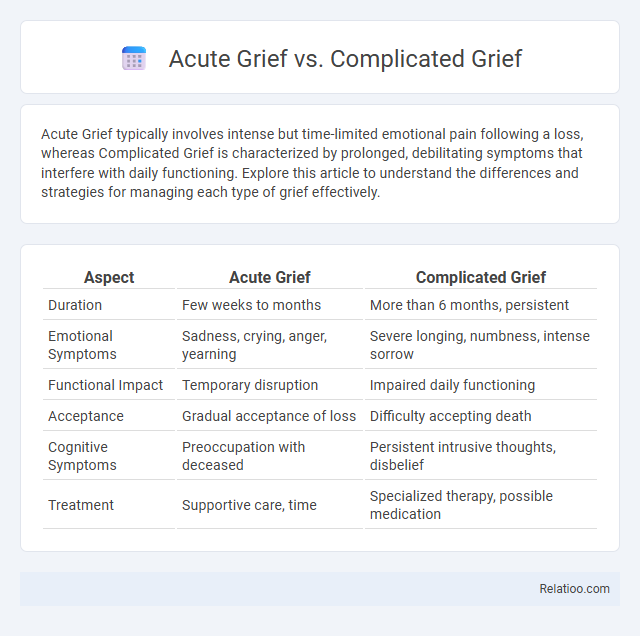Acute Grief typically involves intense but time-limited emotional pain following a loss, whereas Complicated Grief is characterized by prolonged, debilitating symptoms that interfere with daily functioning. Explore this article to understand the differences and strategies for managing each type of grief effectively.
Table of Comparison
| Aspect | Acute Grief | Complicated Grief |
|---|---|---|
| Duration | Few weeks to months | More than 6 months, persistent |
| Emotional Symptoms | Sadness, crying, anger, yearning | Severe longing, numbness, intense sorrow |
| Functional Impact | Temporary disruption | Impaired daily functioning |
| Acceptance | Gradual acceptance of loss | Difficulty accepting death |
| Cognitive Symptoms | Preoccupation with deceased | Persistent intrusive thoughts, disbelief |
| Treatment | Supportive care, time | Specialized therapy, possible medication |
Understanding Grief: Definition and Types
Grief is a natural emotional response to loss, characterized by feelings of sadness, longing, and distress. Acute grief represents the initial intense reaction immediately following a loss, while complicated grief involves prolonged, debilitating symptoms that impair daily functioning beyond typical mourning periods. Understanding these distinctions helps in identifying when professional intervention may be necessary for effective healing.
What is Acute Grief?
Acute grief is the intense and immediate emotional response following the loss of a loved one, characterized by deep sorrow, shock, and yearning. This phase typically lasts for weeks to months and involves a wide range of feelings such as sadness, anger, guilt, and confusion. Understanding your experience of acute grief helps distinguish it from complicated grief, which persists longer and interferes significantly with daily functioning.
Common Symptoms of Acute Grief
Acute grief presents with intense emotional pain, sadness, difficulty concentrating, and disruptions in sleep and appetite, often peaking within the first few weeks following a loss. Unlike complicated grief, which involves prolonged and debilitating symptoms that hinder daily functioning, acute grief symptoms typically diminish in intensity over time. Understanding your experience of these common acute grief symptoms is crucial for identifying when additional support may be necessary.
Defining Complicated Grief
Complicated grief is a prolonged, intense form of grief characterized by persistent longing, intrusive thoughts, and difficulty moving forward after the loss of a loved one, distinguishing it from acute grief, which is a natural, time-limited emotional response. Unlike typical grief, complicated grief disrupts daily functioning and may require clinical intervention for effective management. Understanding the diagnostic criteria outlined in the DSM-5 for persistent complex bereavement disorder aids in identifying and treating complicated grief appropriately.
Key Differences: Acute Grief vs Complicated Grief
Acute grief is the immediate, intense emotional response following a significant loss, characterized by shock, sadness, and yearning, typically diminishing in intensity over weeks to months. Complicated grief, also known as persistent complex bereavement disorder, involves prolonged and debilitating symptoms that interfere with Your ability to function, such as persistent longing, avoidance of reminders, and difficulty accepting the loss beyond six months. Recognizing the key differences between acute grief and complicated grief is essential for timely intervention and appropriate support to promote healthy healing.
Risk Factors for Complicated Grief
Risk factors for complicated grief include a history of mental health disorders such as depression or anxiety, traumatic or sudden loss, lack of social support, and high levels of dependency on the deceased. Prolonged or intense acute grief that disrupts daily functioning beyond six months may indicate complicated grief, differentiating it from normal grief, which generally resolves over time. Identifying these risk factors is critical for early intervention and effective treatment to prevent debilitating outcomes.
How Acute Grief Transitions to Complicated Grief
Acute grief represents the initial intense emotional response following a significant loss, characterized by profound sadness, yearning, and shock. When acute grief persists beyond the expected timeframe and severely impairs daily functioning, it may transition into complicated grief, a chronic state marked by persistent longing and difficulty accepting the loss. Understanding the risk factors such as lack of social support, traumatic bereavement, and pre-existing mental health conditions is crucial in identifying and intervening in this transition.
Impact of Complicated Grief on Daily Life
Complicated Grief significantly disrupts Your daily life by causing intense, prolonged emotional pain, impairing concentration, and reducing motivation to perform everyday tasks. Unlike typical Acute Grief, which gradually eases over weeks or months, Complicated Grief persists for six months or longer, leading to difficulties in relationships and work performance. This persistent distress often necessitates specialized therapeutic interventions to restore normal functioning and improve quality of life.
Treatment Approaches for Grief Disorders
Treatment for acute grief often involves supportive counseling and time to allow natural emotional processing, while complicated grief requires specialized therapeutic approaches such as cognitive-behavioral therapy (CBT) tailored to address persistent and intense symptoms. Pharmacotherapy may be considered in complicated grief cases when comorbid depression or anxiety disorders are present, enhancing overall treatment efficacy. Integrating grief-specific interventions with strategies targeting underlying psychological conditions improves outcomes in diverse grief disorders.
Supporting Loved Ones Through Grief
Supporting loved ones through grief requires recognizing the distinctions between acute grief, complicated grief, and general grief to tailor empathy and assistance effectively. Acute grief involves intense, overwhelming emotions shortly after loss, necessitating compassionate presence and validation of feelings. Complicated grief, characterized by prolonged, debilitating sorrow, may require professional intervention, while general grief benefits from ongoing social support and encouragement to express emotions healthily.

Infographic: Acute Grief vs Complicated Grief
 relatioo.com
relatioo.com